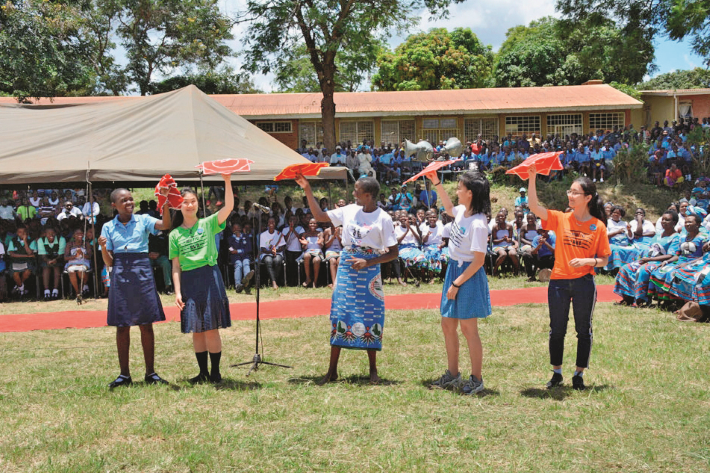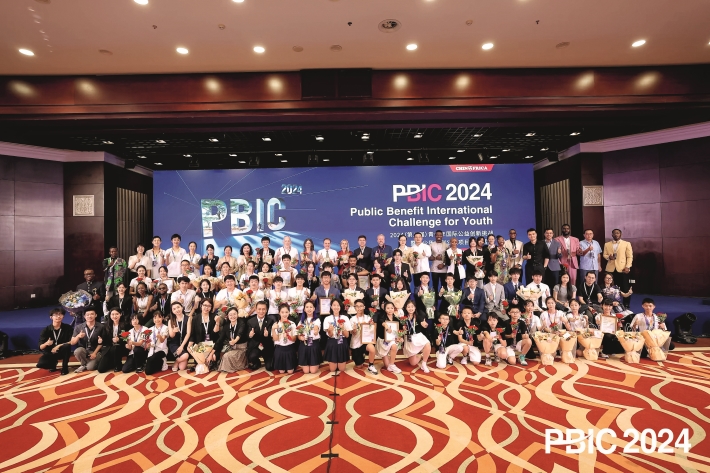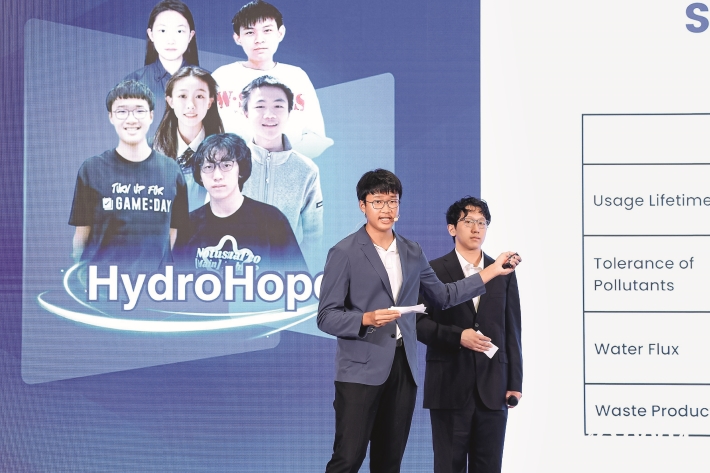|
||||||||||
| Home Top News Economy/Tech Culture/Sports China in Foreign Eyes Green Development Videos Intangible Cultural Heritages |
|
||||||||||
| Home Top News Economy/Tech Culture/Sports China in Foreign Eyes Green Development Videos Intangible Cultural Heritages |
| ChinAfrica |
| Altruism as a Bridge |
| Young people contribute to China-Africa friendship through innovation in public service |
| By Ge Lijun | VOL. 16 September 2024 ·2024-09-02 |

Members of the Music Run team perform a traditional Chinese dance with Malawian students in 2018 (PBIC)
Young people in China now have an international perspective. Fifteen teams of young people around the age of 15 took to the stage to present their community service projects aimed at improving public health, education, access to drinking water, gender equality and the fight against marine pollution in Africa, among others, at the 8th edition of the Public Benefit International Challenge for Youth 2024 (PBIC), held in Beijing on 4 August.
In captivating speeches and polished presentations, the young people, fluent in English, presented their charitable projects, demonstrating a deep understanding and a strong sense of responsibility for the international community. Each speech was warmly applauded by the audience.
PBIC is an international social innovation event for young people, jointly organised by the United Nations Population Fund and the China-Africa Business Council (CABC). The aim of this year’s event was to encourage young Chinese people to adopt an international perspective and develop their leadership qualities and skills. At the same time, it aimed to promote mutual understanding and cultural exchange between young Chinese and Africans so that the young generation can contribute to their country and the world.

Participants at the 8th PBIC pose for a group photo in Beijing on 4 August (PBIC)
The banner of innovation
In the competition, which lasted for two months, 12 school teams were carefully selected for the final show. After two intense rounds of competition with project presentations and question-and-answer sessions, the teams HydroHope, Healing Horizon and Hope for Her were awarded first-class certificates of honour.
The HydroHope team, which is made up of students from various secondary schools, is committed to providing clean, reliable water in Ethiopia using advanced purification technologies. “In the two months it took us to design the project, we deepened our knowledge of Africa and overcame the communication difficulties caused by the geographical distance between the team members, which was an enriching experience for all of us. Now it’s time to implement this project in Ethiopia through various means,” team captain Zhao Guojun told ChinAfrica.
The team has already set up an online donation platform with promotional videos to fund the production and purchase of cleaning equipment. Their aim is to ensure a long-term supply of clean water for residents. “We hope to replicate this model to bring water, the source of life and hope, to the people of Africa,” the video says.
This year’s PBIC focused on seven of the United Nations Sustainable Development Goals: good health and well-being, quality education, gender equality, clean water and sanitation, clean and affordable energy, action on climate change and partnerships to achieve the goals. The event aims to encourage young Chinese to be creative and find innovative solutions to these global challenges.
This edition saw an innovation by involved teams. Three teams of primary school students presented their commitment to charitable projects in Africa that focus on child nutrition, education and cultural exchange between young Chinese and Africans. In addition, an international team of Chinese Americans participated in the online campaign, proving that young people can come together for a common cause despite geographical distance. Their participation, which focused on spreading the art of ballet in Africa, enriched the event by bringing in different perspectives and ideas. It also created enthusiasm among young people for public service in Africa and around the world.

The HydroHope team pitch their project at the 8th PBIC in Beijing on 4 August (PBIC)
Implementation of projects
According to the organiser CABC, PBIC has attracted more than 2,000 students from China and abroad since its first edition in 2017, thanks to the recommendations of various organisations and institutions. Projects such as donation of musical instruments, drones, vaccine coolers, school toilets, wells of friendship and mother-child AIDS prevention programmes have been implemented in Malawi, Zimbabwe, Kenya, Ethiopia and Angola, actively contributing to strengthening mutual understanding and cultural exchanges between China and Africa, especially among young people.
The Music Run team won the second prize at the first PBIC event in 2017. Five young Chinese women launched an initiative to donate musical instruments to schools in Malawi. The members used their pocket money, actively solicited donations from friends, teachers and parents, and raised money through various activities such as charity sales. They raised over $10,000 and bought 414 musical instruments.
All these preparations culminated in their departure for Malawi, where they were able to put their project into practice. The following year, three members of the team arrived in Malawi. Under the coordination of the Chinese embassy in Malawi, the CABC and the Office of the First Lady of Malawi, six schools in the country were selected. They then equipped each school with a music room containing 69 instruments. The then First Lady Gertrude Mutharika attended the donation ceremony, which benefitted more than 2,000 African students.
Over the course of the project, they had several opportunities to visit Africa and take part in various events to get to know the situation on the ground better. “This is a diplomatic initiative by a group of young Chinese women,” said Wang Shiting, former Chinese ambassador to Malawi.
The Green Leaves Volunteers team won first prize at the 4th PBIC in 2020. The team was involved in projects in the fields of education and gender equality. “Technical vocational training is a good way for young African women to combine education and gender equality,” team member Li Yuling told ChinAfrica.
During the implementation phase, the team managed to raise 81,000 yuan ($11,705) and made contact with an orphanage in Nairobi, Kenya, to realise their project. According to one of the team members, the director of the orphanage is very supportive of the project and is helping to find local teachers to teach.
David W. Ferguson, British translator and honorary editor-in-chief of Foreign Languages Press, who was also one of the judges at the closing ceremony of the 8th PBIC, believes that young people can be the best ambassadors for promoting exchanges between China and the world. “These young people have shown a lively and unforgettable spirit through the design, presentation and interaction of their projects. These activities not only deepen people-to-people exchanges, but also provide a stage for young Chinese who are fluent in English to make themselves known on a global scale,” Ferguson told CRI Online.
| About Us | Contact Us | Advertise with Us | Subscribe |
| Copyright Beijing Review All rights reserved 京ICP备08005356号-5 京公网安备110102005860号 |